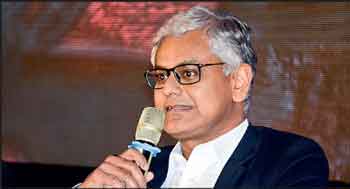Wednesday Feb 18, 2026
Wednesday Feb 18, 2026
Saturday, 8 November 2025 02:10 - - {{hitsCtrl.values.hits}}
 |
| John Keels Holdings Chairman Krishan Balendra – Pic by Upul Abayasekara |
By Charumini de Silva
Ceylon Chamber of Commerce Chairperson Krishan Balendra last night hailed Budget 2026 as a continuation of the country’s post-crisis fiscal discipline and stability, describing it as a key turning point that could usher in a new era of sustained low inflation, stable interest rates and renewed investor confidence.
Speaking at a post-Budget panel discussion organised by EY Sri Lanka for the 25th consecutive year, Balendra said that the 2026 Budget reinforced the policy continuity and macroeconomic discipline that began after Sri Lanka’s 2022 crisis, helping steer the country away from the path of prolonged instability faced by nations such as Lebanon, Venezuela and Zimbabwe.
“From a private sector perspective, this Budget provides stability,” he said.
“With the steps that were taken and the discipline we’ve seen since 2022, Sri Lanka avoided going down the same path as countries that suffered years of high inflation and collapsing exchange rates. This Budget continues that stability.”
Balendra noted that the reforms and fiscal adjustments made over the past two years, though painful, had yielded tangible results.
“If you look at the data, it’s hard to believe this is Sri Lanka. We now have strong revenue growth, low inflation, low interest rates, a reduced fiscal deficit, and even a current account surplus. Most State-owned enterprises (SOEs) are breaking even or turning a profit,” he observed.
He added that with the Central Bank now operating independently by law, confidence is growing that Sri Lanka could, for the first time in decades, sustain a period of low inflation and low interest rates.
“As the private sector realises this stability is here to stay, it will be a game changer,” he said, citing early signs such as commercial banks beginning to offer 10 years long-term fixed-rate mortgages; something previously unheard of.
While commending the Government for positioning the private sector as a “critical stakeholder” in the national growth strategy, Balendra emphasised that the next phase of reform must focus on exports.
“There’s a lot in the Budget that’s positive for exports such as free trade agreements (FTAs), land access, Customs reforms and the national single window system. But the first step should be policy work to identify one or two manufacturing or industrial sectors, where Sri Lanka has a clear comparative advantage and can scale exports sustainably,” he opined.
Balendra suggested that a focused strategy, covering supply chains, logistics, human resources and competitiveness was essential to expand the country’s export base.
“I am optimistic about existing foreign exchange earning sectors like ports, logistics, tourism and IT-enabled services; but for manufacturing exports, we need to pinpoint where we can truly compete and build scale,” he stressed.
Balendra reiterated that maintaining fiscal discipline and deepening export-oriented reforms would be pivotal to cementing investor confidence and ensuring long-term private sector growth.